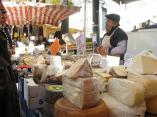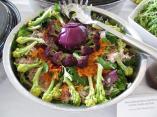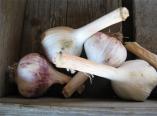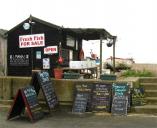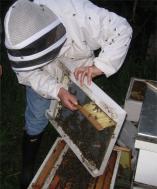An interesting interview with Whole Foods co-president Walter Robb. The CEO of Whole Foods, John MacKay, posts a blog on the company’s website. Of interest to me and my recent reading is the exchange of public letters between MacKay and Michael Pollan, discussing Pollan’s somewhat skeptical take on the Whole Foods phenomenon in The Omnivore’s Dilemma. and the expansion of organic food production and retailing into something that rather too closely resembles the system that organics grew up to counteract.
David Szanto, who completed our course at UniSG in November, joined us for some merrymaking at the Quebec cheese tasting evening last week, and he pointed me to a recent article in The Guardian, The Organic Church Splits, about the Soil Association which I suppose you could say turns some of the same ground from a British perspective; and there was an earlier article and podcast on US organics in Business Week last October. An op-ed piece in the New York Times called The Amber Fields of Bland explains the US farm bill, and the terrifying span of its coverage, and just what it has done to food production in that country.
I’ve been watching a dvd called The Future of Food which MJ brought back from Canada. About farmers, farming, gmo crops and seed/pesticide monopolies, it’s an excellent introduction to the realities of farming today and the issues we should all be attending to in our food. I liked the dvd extras, which included a clip from Michael Pollen responding to the question about ‘will food cost more in future’ – yes, he said, but it’s artificially cheap right now because of heavy crop and farming subsidies in the US and Europe, and people need to perhaps look at their relative priorities: which do you want to spend your money on more each month: safe/nutritious food or $40+ on cable tv? He also made the excellent point that prepared food is always more expensive than food you cook: so people need to learn to cook. But they also need sources for raw ingredients: in some poor neighbourhoods it’s simply impossible even to buy fresh fruit or vegetables.
Doris pointed us to a well respected Austrian documentary on themes of food and hunger, We feed the world – global food which I’d like to have a look at someday.
There’s a Belgian-made short documentary you can view online at EUX-TV called Chicken Madness, about dumping of chicken surpluses in Africa by western countries such as Belgium, Germany, Holland and Brazil. It seems we’ve got very picky in the western world and we just don’t want to eat all of the chicken, so we sell the icky bits to someone hungrier than us. But the lack of effective licensing (=political corruption) and the dearth of functioning cold storage facilities at the receiving end results in an economic double-whammy: food spoilage and the trashing of African poultry farming which can’t compete with the prices — or the convenience of a ready-to-cook product, however tainted. But the industrialised world is committed to free trade at (literally) all costs. As one African farmer bitterly noted, would the US and Europe be ok with the destruction of their local economies in the name of globalisation? Something to think about next time you pick up a packet of chicken breasts…
And I recently listened to a podcast about nutritional food labelling. An education in how little consumers understand of what they read on the label: consumer food education has a long way to go. One telling example from the American representative who said that the majority of American consumers surveyed could not say what a typical daily calorie intake ought to be, despite the calorie information printed on the food labels since 1994 which stated that it was based on a 2000 calorie per day allowance; and that they often disregarded serving size recommendations and simply ate the whole packet. Which says something about labelling, obesity and education.
